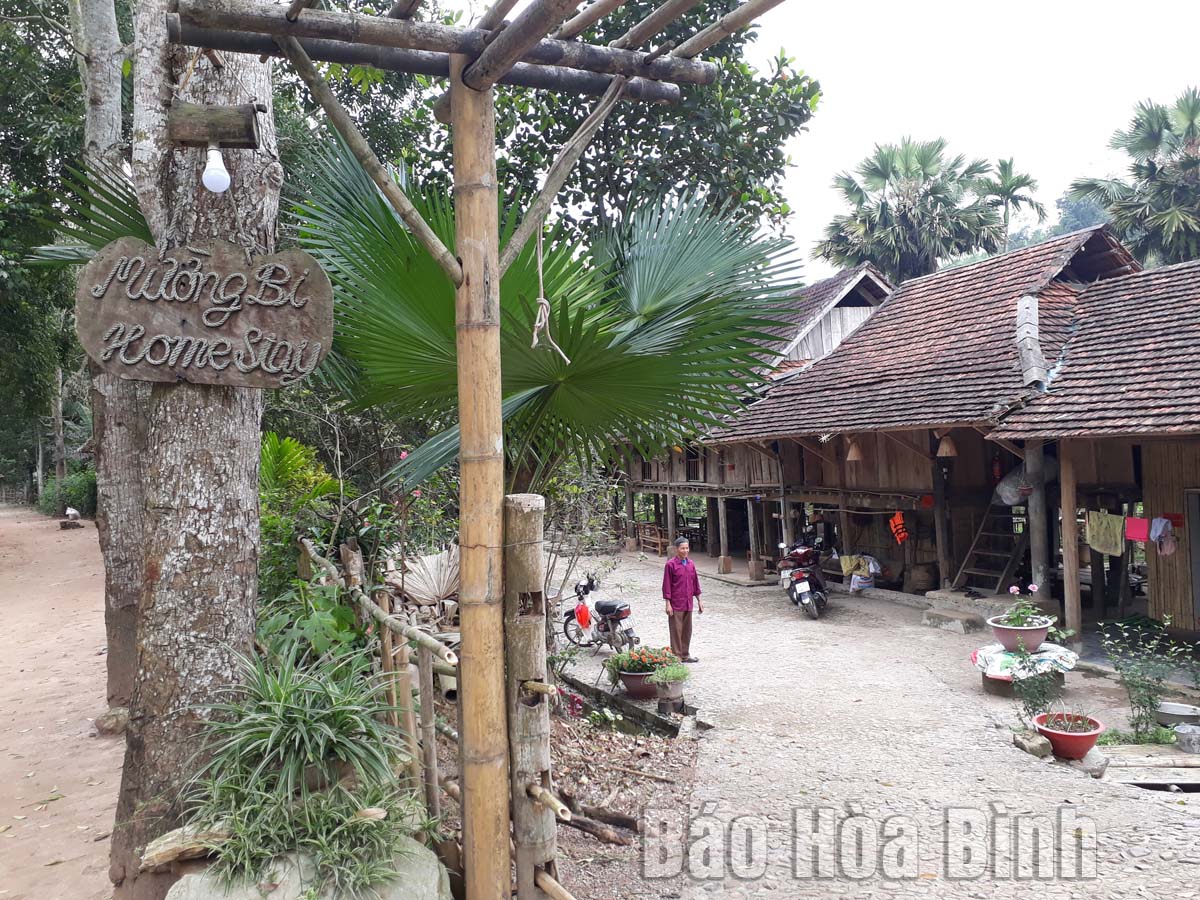
(HBO) – Sung hamlet of Da Bac district’s Cao Son commune is home to more than 70 Dao ethnic minority households.
Muong ethnic people in Luy Ai hamlet in Tan Lac district’s Phong Phu commune preserve their stilt houses and traditional cultural values in association with community-based tourism development.
From a locality that mainly engaged in agricultural production,
Sung hamlet has become an attractive community-based tourism destination. In
2008, there were not many services for tourists. Now, the hamlet’s roads have
been concretised. Locals have poured capital into homestays. In particular,
people still keep their traditional houses, maintain brocade weaving and revive
their unique cultural features.
Dang Van Xuan, owner of a homestay establishment in Sung hamlet, said that over
70% of tourists who visit and stay overnight in the village are foreigners,
adding that they are excited to experience the cultural characteristics of the
Dao ethnic people.
He also said that an art troupe, a brocade weaving and a tour guide team have
been set up todiversify the hamlet's services.
Coming to Sung hamlet, visitors can also bathe in herbal water from the
traditional medicine of the Dao ethnic people and enjoy traditional dishes.
Luy Ai hamlet in Tan Lac district’s Phong Phu commune where Muong ethnic
minority people inhabit is also a community-based tourism site in the province.
like Sung hamlet, tourism products of Luy Ai hamlet are stilt houses, the
customs and habits, the beauty in daily life and the culture of the Muong ethnic
people.
Dinh Cong Lon's family was one of the first households to involve in tourism
activities in Luy Ai hamlet. His family upgraded their old stilt house which is
over 30 years old to serve guests. Despite being refurbished, it still keeps
the typical features of a Muong stilt house.
The development of community-based tourism has changed the lives of people in
Sung and Luy Ai hamlets and other hamlets will also enjoy positive changes
thanks to this orientation.
Preserving and promoting the fine traditional cultural values of ethnic
minorities in association with tourism development is one of the important
projects in the implementation of the National Target Programme on
socio-economic development of ethnic minority and mountainous areas in the 2021
– 2030 period, with the first phase from 2021 - 2025, in the province.
It focuses on preserving and promoting traditional cultural values, fostering
and training cadres who are in charge of cultural affairs as well as supporting
cultural facilities and equipment for ethnic minorities and mountainous areas
to improve the spiritual life for ethnic minorities in association with
community-based tourism development.
The implementation of the project is expected to contribute to preserving and
promoting the traditional cultural values of ethnic minorities in the
locality./.
Located just a 20-minute drive from Hoa Binh City, Ora Hill Farmstay & Glamping Hoa Binh is a captivating new destination nestled in Mo hamlet, Bình Thanh commune, Cao Phong district. Combining farming with leisure, this tranquil retreat is perfect for those seeking balance, joy, and an immersive experience in the expansive beauty of nature.
Muong Bi - Tan Lac is renowned as one of the four famous Muong regions in Hoa Binh province. Blessed by nature with a favourable climate and stunning landscapes, Tan Lac holds great advantages for tourism development. The local tourism industry has made remarkable strides in recent times thanks to the attention and support from the local authorities and sectors.
With its strategic location, well-developed transport network, and diverse soil and climatic conditions, Hoa Binh is emerging as a must-visit destination in Vietnam's northwestern tourism corridor. The province boasts numerous attractions, including the Kim Boi hot springs (Kim Boi district), the Dau Rong cave complex (Cao Phong), the Mai Chau valley (Mai Chau), and the iconic Hoa Binh hydropower plant.
The northern mountainous province of Hoa Binh has been listed among the 71 most beautiful places to visit worldwide by the prestigious US travel magazine Condé Nast Traveller.
Hoa Binh province’s rich natural and cultural resources position it as a prime location for developing community-based tourism (CBT). In recent years, support from central and provincial policies, as well as assistance from non-governmental organisations, have encouraged local ethnic minority and mountainous communities to actively engage in the sector.



